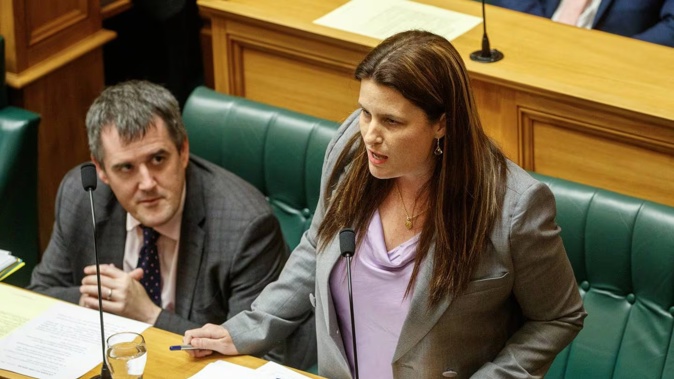
Finance Minister Nicola Willis has warned the Government could struggle to meet the surplus forecast for the 2027 year, a goal included in its pre-election fiscal plan, blaming worsening economic conditions which will cause multiple years of lower tax income.
Speaking to business publication Bloomberg during her trip to Australia, Wills said, “I wouldn’t describe myself as optimistic about hitting the budget surplus” in the 2026-27 fiscal year.
“I think it is realistic to say that given the downgraded forecast we’ve seen for the growth trajectory since then, you would expect that to have a revenue impact. And so that surplus position is challenged,” Willis said.
Labour was forecasting a surplus in the same year in its own fiscal plan, and in Treasury urged the Government commit to commit to returning to surplus in the 2026/2027 fiscal year “at the latest”.
Despite the warnings, Willis told the Herald the Government was still committed to its tax cut plan, which was costed at $14.6 billion prior to the election. The true cost will have changed, owing to increased costs of accelerating the restoration of interest cost deductions for landlords and dropping a Working for Families tax change.
“We remain committed to our coalition agreements including plans to deliver tax reductions, reprioritise wasteful spending and support frontline services. Details will be announced in the Budget,” Willis told the Herald.
The Government seems keen to signal it will struggle to meet its surplus goal. Facing patsy questions from Rima Nakhle, Willis said the Budget forecasts published in May would show the result of a deteriorating environment.
“Data revisions... since the Half-year update in December indicate that the economy is likely to be in a weaker position this year than was anticipated before Christmas. That will flow through to forecasts to tax revenue, so I expect the Crown to be collecting less revenue over the next few years than was previously expected,” Willis said.
New Zealand has been running an OBEGAL [Operating Balance Before Gains And Losses] deficit since 2019. It is forecast to be the longest string of deficits since New Zealand switched to current accounting methods in the early 1990s.
During the campaign, National said its cuts to existing spending and reducing the growth of new spending would mean a larger surplus in 2027. Labour had committed itself to a razor-thin surplus of $2.1 billion.
National said its cuts would lead to a larger surplus of $2.9b.
Treasury told the incoming Government that hitting a surplus in 2027 should be a top priority, and recommended both spending restraint and tax increases like a capital gains tax in order to achieve that goal.
“On balance, the Treasury recommends prioritising a return to surplus in 2026/27 at the latest. Such an objective would send a clear signal of the Government’s commitment to responsible economic and fiscal management. It would support monetary policy to lower inflation, and higher government saving will also contribute to narrowing the current account deficit,” Treasury said in its briefing to Willis.
Thomas Coughlan is Deputy Political Editor and covers politics from Parliament. He has worked for the Herald since 2021 and has worked in the press gallery since 2018.
Take your Radio, Podcasts and Music with you









